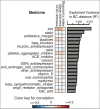The influence of proton pump inhibitors and other commonly used medication on the gut microbiota
- PMID: 28118083
- PMCID: PMC5570416
- DOI: 10.1080/19490976.2017.1284732
The influence of proton pump inhibitors and other commonly used medication on the gut microbiota
Abstract
Proton pump inhibitors (PPIs), used to treat gastro-esophageal reflux and prevent gastric ulcers, are among the most widely used drugs in the world. The use of PPIs is associated with an increased risk of enteric infections. Since the gut microbiota can, depending on composition, increase or decrease the risk of enteric infections, we investigated the effect of PPI-use on the gut microbiota. We discovered profound differences in the gut microbiota of PPI users: 20% of their bacterial taxa were statistically significantly altered compared with those of non-users. Moreover, we found that it is not only PPIs, but also antibiotics, antidepressants, statins and other commonly used medication were associated with distinct gut microbiota signatures. As a consequence, commonly used medications could affect how the gut microbiota resist enteric infections, promote or ameliorate gut inflammation, or change the host's metabolism. More studies are clearly needed to understand the role of commonly used medication in altering the gut microbiota as well as the subsequent health consequences.
Keywords: gut microbiota; medication; proton pump inhibitors.
Figures


Erratum for
- Addendum to: F Imhann, MJ Bonder, A Vich Vila, J Fu, Z Mujagic, L Vork, EF Tigchelaar, SA Jankipersadsing, MC Cenit, HJ Harmsen, G Dijkstra, L Franke, RJ Xavier, D Jonkers, C Wijmenga, RK Weersma, A Zhernakova.. Proton pump inhibitors affect the gut microbiome. Gut 2016. doi: 10.1136/gutjnl-2015-310376
References
-
- Dutch Foundation for Pharmaceutical Statistics (SFK) Data and facts medication use in the Netherlands in 2015. 2016.
-
- Moayyedi P, Talley NJ. Gastro-oesophageal reflux disease. Lancet 2006; 367:2086-100; PMID:16798392; http://dx.doi.org/ 10.1016/S0140-6736(06)68932-0 - DOI - PubMed
-
- Bouwknegt M, Pelt W Van, Kubbinga ME, Weda M, Havelaar AH. Potential association between the recent increase in campylobacteriosis incidence in the Netherlands and proton-pump inhibitor use – an ecological study. Eurosurveillance 2014; 19(32):20873. - PubMed
-
- Leonard J, Marshall JK, Moayyedi P. Systematic review of the risk of enteric infection in patients taking acid suppression. Am J Gastroenterol 2007; 102(3):2047-56; PMID:17509031; http://dx.doi.org/ 10.1111/j.1572-0241.2007.01275.x - DOI - PubMed
-
- Janarthanan S, Ditah I, Adler DG, Ehrinpreis MN. Clostridium difficile-Associated Diarrhea and Proton Pump Inhibitor Therapy: A Meta-Analysis. Am J Gastroenterol Nature Publishing Group; 2012; 107(7):1001-10; PMID:22710578; http://dx.doi.org/ 10.1038/ajg.2012.179 - DOI - PubMed
Publication types
MeSH terms
Substances
LinkOut - more resources
Full Text Sources
Other Literature Sources
Medical
Research Materials
